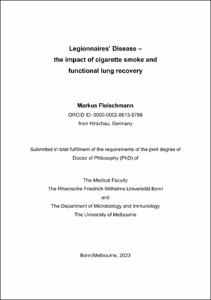Legionnaires' Disease - the impact of cigarette smoke and functional lung recovery

Legionnaires' Disease - the impact of cigarette smoke and functional lung recovery

| dc.contributor.advisor | Garbi, Natalio | |
| dc.contributor.author | Fleischmann, Markus | |
| dc.date.accessioned | 2023-02-14T15:15:58Z | |
| dc.date.available | 2023-02-14T15:15:58Z | |
| dc.date.issued | 14.02.2023 | |
| dc.identifier.uri | https://hdl.handle.net/20.500.11811/10641 | |
| dc.description.abstract | Legionnaires’ Disease is a severe type of pneumonia most commonly caused by the bacterial species Legionella pneumophila and Legionella longbeachae. Epidemiological studies show that cigarette smoke is a major risk factor for susceptibility to Legionnaires’ Disease, but the underlying mechanisms for this connection are not known. During pneumonia, efficient oxygen uptake in the lung is compromised due to pathogen invasion and the resulting immune response. Some types of immune cells are known to resolve inflammation and promote regeneration of lung structure and function. However, the underlying mechanisms by which immune cells aid in lung recovery from bacterial pneumonia are not well understood.
We used a mouse model of acute cigarette smoke exposure and Legionella infection to assess how cigarette smoke could impact the immune response towards Legionella and confer more severe disease. This work provides evidence that acute cigarette smoke exposure alone depleted alveolar macrophages (AM) in lungs of wild-type mice, which is contrary to the currently accepted view that smoking causes accumulation of AM within the airways. We investigated the cell death pathways that could be activated by cigarette smoke in AM and found that, in smoke-treated ASC-/- and NLRP3-/- mice, the smoke-induced AM depletion observed in wild-type mice was reversed. These results suggest an important role of NLRP3-dependent pyroptosis, a type of inflammatory cell death, in driving smoke-induced AM death in vivo. Legionella sp. subvert host immunity to establish a protected vacuole for bacterial replication within AM. Concurrent infection of smoke-treated mice with L. pneumophila caused more severe disease progression and significantly delayed bacterial clearance. In a model of clodronate-induced AM depletion, L. pneumophila clearance was similarly delayed in later stages of infection, despite limited bacterial replication early after infection due to the depletion of the bacteria’s replicative niche. In contrast, after concurrently infecting smoke- exposed mice with L. longbeachae, bacterial clearance was slightly accelerated. Therefore, smoke-induced AM death may be a risk factor for Legionnaires’ Disease caused by L. pneumophila. How AM mediate bacterial clearance under normal circumstances remains subject of future investigation. Using the mouse model of Legionnaires’ Disease, we assessed how immune cells impacted functional lung recovery. Surprisingly, we observed that neutrophils play an important role in the re-establishment of efficient oxygen uptake during the recovery phase from L. longbeachae infection. Neutrophils promoted the proliferation of type II alveolar epithelial cells, local progenitor cells that regenerate the alveolar epithelium. Mechanistically, neutrophils contributed to the production of several cytokines and growth factors associated with epithelial cell proliferation after pulmonary infection such as amphiregulin, TNFα, or IL-1β. These results provide novel insights into a regenerative role of neutrophils in the recovery phase of bacterial pneumonia. | en |
| dc.language.iso | eng | |
| dc.rights | In Copyright | |
| dc.rights.uri | http://rightsstatements.org/vocab/InC/1.0/ | |
| dc.subject.ddc | 570 Biowissenschaften, Biologie | |
| dc.subject.ddc | 610 Medizin, Gesundheit | |
| dc.title | Legionnaires' Disease - the impact of cigarette smoke and functional lung recovery | |
| dc.type | Dissertation oder Habilitation | |
| dc.publisher.name | Universitäts- und Landesbibliothek Bonn | |
| dc.publisher.location | Bonn | |
| dc.rights.accessRights | openAccess | |
| dc.identifier.urn | https://nbn-resolving.org/urn:nbn:de:hbz:5-69837 | |
| ulbbn.pubtype | Erstveröffentlichung | |
| ulbbnediss.affiliation.name | Rheinische Friedrich-Wilhelms-Universität Bonn | |
| ulbbnediss.affiliation.location | Bonn | |
| ulbbnediss.affiliation.otherLocation1 | Melbourne | |
| ulbbnediss.affiliation.otherName1 | Universität Melbourne | |
| ulbbnediss.thesis.level | Dissertation | |
| ulbbnediss.dissID | 6983 | |
| ulbbnediss.date.accepted | 07.02.2023 | |
| ulbbnediss.institute | Medizinische Fakultät / Institute : Institut für Experimentelle Immunologie (IEI) | |
| ulbbnediss.fakultaet | Medizinische Fakultät | |
| dc.contributor.coReferee | van Driel, Ian | |
| ulbbnediss.contributor.orcid | https://orcid.org/0000-0002-8613-9788 | |
| ulbbnediss.contributor.gnd | 129924615X |
Dateien zu dieser Ressource
Das Dokument erscheint in:
-
E-Dissertationen (1600)




